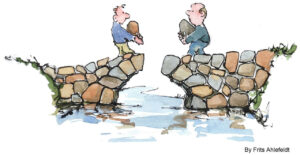Everybody knows about IQ (Intelligence Quotient). It measures your intellect. The bad news is that your IQ is a number that will be relatively fixed by the time you reach 20. Your IQ does not increase with age BUT the good news is that you can add to your overall IQ through learning, through training and through life experiences. This enhancement process has two measures – the so-called ‘Technical Quotient’ (TQ) and the ‘Emotional Quotient’ (EQ) or Emotional Intelligence.
Iq (Intelligence Quotient) + Tq (Technical Quotient) X Eq (Emotional Quotient) = Success Potential
Your TQ measures how technically skilled you are – ie whether or not you are the best engineer, the most creative designer or the top ranking sales person. Your EQ measures your emotional maturity – ie how skilled are you in terms of your ability to use the “soft skills” when interacting with people.
Emotional Intelligence or EQ is made up of your levels of
- Self-awareness
- Self-management
- Social awareness
- Social skills or group management and
- Adaptability.
Whereas your IQ reaches a level and then plateaus, your TQ and your EQ can be heightened indefinitely.
You add to your TQ by learning new technical skills and by practising them until you become highly competent.
You develop your Emotional Intelligence (EQ) by investing in and learning about such things like psychology and personal self-development. There are many books on these subjects but for starters, try “What Got You Here, Won’t Get You There” or “Triggers” both by Marshall Goldsmith (one of world’s top Executive Coaches).
Emotionally Mature People Have an Open Mind and Will Accept Constructive Feedback
Essentially, you mature your EQ by starting with looking inward. Emotionally intelligent people are open to constructive criticism. They are willing to stop certain behaviours that are holding them back. They are open to being shown their self limiting patterns. They are willing to try new things even though it makes them feel vulnerable or fearful.
Consider the human potential in your current team.
It can be measured by a very simple formula: (IQ +TQ) x EQ = Human Potential.
Lets assume that you have smart, technically able people in your team. That takes care of the TQ and the IQ. So its how they behave that is the key to how cohesive and functional they will be as a group.
If you (and they) work on the EQ levels in the group, you/they will develop a cohesive, functional team.
To put this into context.
Take tennis player, Roger Federer. He is a reasonably intelligent guy and he has natural ability. I imagine that he would probably have a reasonable IQ score and after years of practising his technique, his TQ or technical knowledge and experience is immense. Whilst there are other players with equally impressive skills, what sets Federer apart from the rest and makes him a great player – a champion – is his EQ.
He knows how to control his emotions to get the best out of himself. He has high levels of self-awareness, self-management and well-honed adaptability skills.
In a team sports context, the level of EQ that is present is the difference between an average team and a championship winning team. Members of a sports team have to work not only with their own emotions but also with those of their teammates.
They have to work on their social awareness levels and they have to practise their social skills. They work hard on creating esprit de corp. This is because they know that it is this that gives them the ability to impact positively the outcome of a game.
Take a Leaf Out of the All Blacks Play Book
A winning team is one which has a strong level of emotional well-being present in the group. A great book that goes into emotional intelligence in a way that is easily accessed by team members is a book called ” Legacy” by James Kerr – its about the New Zealand All Blacks and how they create a solid team mentality.
The level of EQ that is present in a business will be the difference between an averagely performing business and one that is flourishing.
Just as in a sports team, in any business, there is a collection of people working together to achieve outcomes (make sales, deliver profits, serve the clients well) but unlike a sports team, often there will be way more members in the team. Not only that but there is little focus on training as a team and being a team.
The Absence of Team Bonding and Team Meetings Does Not Help
Whereas a sports team will attend weekly (or daily) training sessions that are designed to up skill them, to bond them as a team and to motivate them, rarely will a business team have such sessions.
If there are team meetings in a business, 99% of them won’t be meetings that talk about the team. They will talk about clients or customers. They will talk about what work is in on hand and what is coming up.
What’s needed is for the team to have sessions that talk about the performance of the “players” in the team and just like training sessions, this should happen every week, come hell or high water.
Whereas a sports team has to focus intensely just for an hour or so when it is “show time”, in business, the demand for peak performance is never ending.
Consider Getting a Dedicated Performance Coach for Your Team
Performance expectations are ever present. The pressure is relentless – day after day, week after week… And yet, whilst a sports team will have a coach who works on the player’s motivation and the mind-set of the players (as well as on their technical ability), it’s rare for such a role to be performed in business.
If this role is performed at all, mostly the job will fall on the shoulders of the business owner or the CEO. It’s yet another hat for them to wear. Few have been trained in how to manage a team; never mind in how to develop the soft skills of a team.
Master the Art of Developing People’s Emotional Intelligence
But when we heighten the EQ skills of those at the top, it is a gift that keeps on giving. When your people can better understand and be in better control of their own emotions, they are able to better manage their team.
When they have increased social skills or group management abilities, they can influence their team members far better. When they have augmented their leadership skills, the business will be more successful because the players will be “playing” the game far better.
So to wrap up – this is good news. Each of us can increase our EQ endlessly. We can improve our TQ if we need/choose to.
Encourage your team to be open minded. Expect them to be willing to learn. Arrange for them to be mentored so that they can see the wood for the trees.
If you are the Business Owner, decide to be fine-tuned and then you will be en route to releasing your own full potential. Once you are on your way, your team can be on their way too. This will be a win win for you, your team, your clients and your business.
How Do I Know This?
Like you, I’ve been in the driver seat of a business, and found myself spinning wheels and struggling to manage people. The fear nearly killed me, and I burned out before I decided enough was enough.
Working with business owners as a Business Coach today, it never ceases to amaze me how much pain business owners are willing to endure before facing their fears and making a shift. As they grow in emotional intelligence, they benefit immensely because they figure out how to build their dream team. You can read about my journey from legal professional, to business owner, to #1 Business Coach here:








